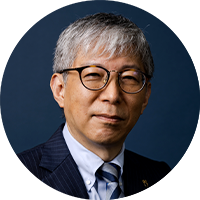Coach's VIEW is a business column authored by executive coaches in COACH A, aimed at providing valuable insights and effective approaches for leveraging coaching to foster organizational and leadership development. The column draws on the latest coaching trends and data, as well as insights from notable global publications on coaching.
What are the Crucial Questions for Building a Sustainable Organization?

With the prolonged COVID 19 pandemic, some of us may feel anxious about the future, wondering what the future will bring. Amidst the uncertainty of the future, what questions can be asked now to shed some light upon us?
Ashley Harshak, an economist and executive coach, points out that "three questions are effective in establishing a sustainable organization".
These three questions are:
"Where are we going?"
"What do we do?"
and,
"Who are we?"
Why are these three questions effective in building a "sustainable organization"?
What is More Important than Managing the Present and Generating the Future?
According to Harshak, the question "What do we do? " is the one that leads to allocating management resources, optimizing the performance of the entire organization, and delivering results. "Where are we going?" is also related to building a vision, outlining a strategy, and developing business. And "Who are we? "is the question that leads to differentiation from other companies and the source of competitive advantage.
Managing the status quo, creating the future, and defining the organizational identity that will lead to competitive advantage, is the key to sustainability. He believes that we tend to neglect focusing on our identity, even though we are working hard to "manage the status quo" and "create the future" in many organizations. In other words, "What do we do?", "Where are we going?" are focused on, but "Who are we?" is often overlooked.
On the other hand, Harshak also noted that many executives are actually aware of the gravity of this question. Harshak says that one of the top executives said "The culture supporting the brand is the biggest barrier to sustainability," despite the fact that this question is often overlooked in the business field. Harshak also said that culture is the "raison d'etre=the meaning of existence" of an organization. Having said that, he emphasized the relevance of questioning the meaning of existence.
What does the Question "Who Are We?" Bring?
One of the key questions during my own coaching is actually about the raison d'etre of the client's existence. I often ask my clients to think about the question, "Who am I?".
It is becoming more and more difficult to envision the future with the story that we have created so far. The question "Who am I?" is a good opportunity to create a new story. For example, the following story may be easy for us to understand.
The story is about an athlete who was obsessed with winning, but after an injury, he finds it difficult to win and becomes frustrated because he cannot see a future. In the midst of all this, he reaffirmed his "raison d'etre" as bringing courage to others through his performance and reinvented himself.
In this way, giving meaning to "who you are" becomes the catalyst for creating a new story.
Is there a Connection between the "Raison d'etre of the Organization" and the "Raison d'etre of the Individual"?
As Harshak explains, clarifying the "raison d'etre" of an organization is an important factor in creating a sustainable organization. However, I believe that it is also important to clarify the "raison d'etre" of the individual as well.
If the "raison d'etre" of the individual is clear and connected to the "raison d'etre" of the organization, the individual will see what happens in the organization as his or her own matter, and as a result, the organization will be able to sustain and develop.
One of my friends, who works in a medical institution, is almost in agreement with the organization's raison d'etre, which is to protect the healthy lives of patients, and his own raison d'etre, which is to support the future happiness of patients. Hence, his passion for his work and contribution to the organization is also very high.
On the other hand, if one's own "raison d'etre" is not clear, or if it is too far disconnected from that of the organization, it will be difficult to maintain motivation for one's own work.
In this case, it is necessary to engage in clarifying the individual's "raison d'etre" and connect it with the "raison d'etre of the organization"; in other words, it is essential to create dialogue.
* * *
Three questions must be considered in order to build a sustainable organization. In particular, remember the question, "Who are we?". The key point is how to connect the "raison d'etre" of the individual to the "raison d'etre" of the organization.
As the future becomes increasingly uncertain, I believe that leaders are required to ask themselves and the people around them about the "raison d'etre" as well as the "raison d'etre" of their organization.
[Reference]
Ashley Harshak, “CHANGE TODAY, THRIVE TOMORROW”, January 30, 2020
*Regardless of profit, non-profit or intranet, secondary use such as copying, diversion, selling etc. is prohibited without permission.
Language: Japanese

